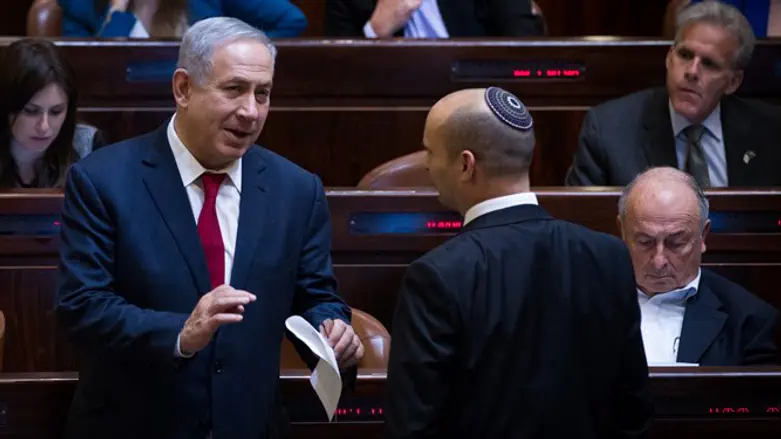
The writer is Deputy CEO of The Legal Forum for Israel
The Knesset's winter session will commence in a week's time with several burning issues on the agenda. The approaching elections have given rise to the feeling that our elected representatives are facing possibly their last chance to deal seriously with the nationalist issues that hold significance for the country's citizenry, before they are sucked into the dizzying round of handshaking at bar mitzvas and photo ops with smiling infants that precede elections.
So what went on in the Knesset this summer? The Nationality Law, the Draft Law, the Regulation (aka Normalization) Law, the Breaking the Silence Law, a struggle with the infiltrator issue, the slashing of terrorist salaries from the funds transferred to the Palestinian Authority – for starters. In between those fiery sessions, corrections were made to the Foundations of Jurisprudence Law and the Law of Courts for Administrative Affairs. Each of these and many others were accompanied by stormy disputes and emotional displays.
The coming winter is not going to be much calmer. The short summer session's debates were stormy because they dealt with subjects that descend deep down to the roots of Israeli society, its essence and character. The public debate on the values of the State of Israel as a Jewish and democratic state is ongoing and nothing new, but it seems that this time it was more significant and game-changing in nature.
The Nationality Law was a simple and clear example of the conflicts in Israeli society regarding the country's ethos and value system, and those disagreements also came to the fore in debates on the war against illegal infiltrators or on anti-Zionist organizations in schools: How much can Israel allow itself to descend to the depths of a "state of all its citizens?" How much is the Jewish dimension of the state felt in the daily life and norms set by society? Are democracy and the guarding of civil rights equal in value to the nationalist-Jewish aspects of the state, and to other values? These are the questions Israel's Knesset will ask itself and us during the winter session as it did in the summer. The debates on the laws placed on committee agendas, the speeches given in the plenum, the interviews in the media – will all deal with the desire to find the balance between being both a democracy and a national Jewish home.
The Knesset, however, is not the lone player on the opinion field. Two other branches of the government work with it, the Executive and Judicial, the government and the court. Both carry much weight in deciding how to balance the country's Jewish democracy dialectic.
Years ago, there may not have been any dilemma. In the Declaration of Independence, it was clear that any individual who lives in Israel has civil rights and that there are collective rights for the Jewish people as a whole. Based on this understanding we declared a state. As time passed, and especially after Aharon Barak effected a constitutional revolution in the High Court, the democratic dimension began to overshadow the Jewish dimension, and nationalist, collective Jewish rights were pushed aside in favor of protecting the rights of minorities or mankind in general.
In a series of precedents and legal decisions the balance was slowly lost and we reached a situation where the courts decided that the rights of the Netiv Haavot, Amona or Migron residents to live in their homes are to be pushed aside in favor of the (unrealizable) rights of Arabs who claimed ownership of the land; the courts declared that the rights of a terrorist's family members take precedence over the rights of his victims; that the right of the judiciary to invalidate laws trumps the people's right to enact them.
That is why the way the Knesset functions in the democratic ballpark is so important right now. The representatives elected by the public to the Knesset and government can outflank the High Court from the right: they can make courageous government decisions regarding the infiltrators, pass laws such as the one concerning the Attorney General's role, accelerate the process of declaring Israeli law sovereign in Judea and Samaria and change the makeup of the committee that chooses Supreme Court justices.
That is the only way to reach the long-sought after balance – between the values of the Jewish State and between those of the three branches of government.
This article originally appeared in the Makor Riishon Hebrew newspaper. Translated by Rochel Sylvetsky, Arutz Sheva Op-ed and Judaism Editor.
